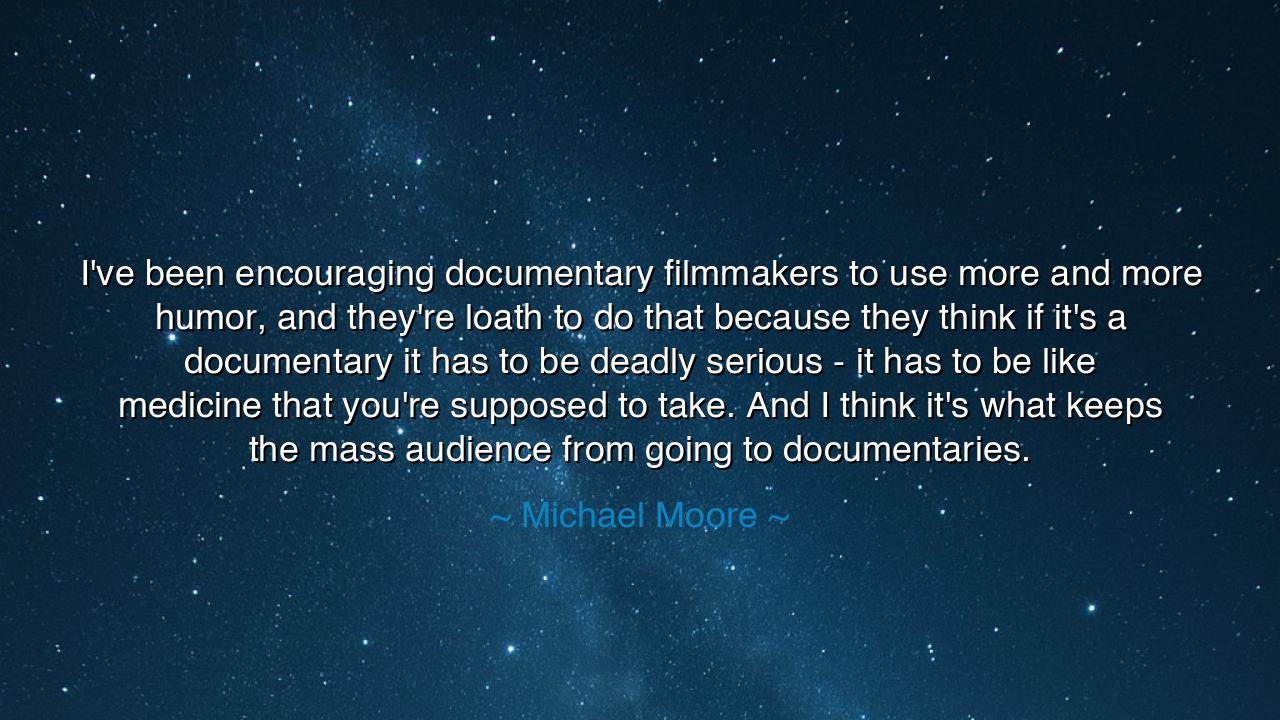
I've been encouraging documentary filmmakers to use more and more
I've been encouraging documentary filmmakers to use more and more humor, and they're loath to do that because they think if it's a documentary it has to be deadly serious - it has to be like medicine that you're supposed to take. And I think it's what keeps the mass audience from going to documentaries.






In the age-old quest for truth, humans have always sought to capture the essence of the world around them. The documentary, as a form of storytelling, has long been considered a sacred vessel for conveying reality, history, and facts. Yet in the words of Michael Moore, "I've been encouraging documentary filmmakers to use more and more humor, and they're loath to do that because they think if it's a documentary it has to be deadly serious—it has to be like medicine that you're supposed to take. And I think it's what keeps the mass audience from going to documentaries," we hear a powerful challenge to the notion that seriousness is the only path to truth. Moore calls upon us to reconsider the ancient understanding of humor, not as a distraction, but as a tool—a means of connection, of insight, and of truth.
The ancients knew well the power of humor as a vehicle for wisdom. In ancient Greece, Aristophanes, the master of satire, wielded humor not just to entertain, but to expose the absurdities of society, politics, and human nature. His plays were filled with laughter, yet they carried a weight of serious reflection—pointing fingers at the flaws of democracy, the corruption of leaders, and the contradictions of human behavior. In The Clouds, for example, Aristophanes used comedy to challenge the philosophers of the time, particularly Socrates, and their perceived detachment from the practical realities of life. The humor was sharp, the stakes high, and through laughter, the audience was led to see the world in a new light. Moore, in encouraging documentary filmmakers to embrace humor, is following in this ancient tradition, recognizing that laughter can be an act of clarity, one that opens the mind to deeper truths.
In the Roman world, Juvenal, the great satirist, also understood the power of humor in telling uncomfortable truths. His Satires criticized the moral decay and hypocrisy of Roman society, exposing the flaws of both the ruling class and the common people. While his works were filled with sharp wit and often biting sarcasm, they served as a mirror for the Romans, reflecting back the moral and social realities they preferred to ignore. Just as Moore sees humor as an important tool in documentaries, Juvenal used humor to confront the most serious issues of his day. His work reminds us that humor, when wielded wisely, can pierce through the denial and avoidance that often surround difficult truths.
The ancient Stoics, particularly Epictetus and Seneca, also recognized the importance of laughter in the face of life’s trials. The Stoics taught that while we cannot control the external world, we can control our responses, and humor was often a way to gain perspective and maintain equanimity. The ability to laugh at the absurdity of life, even in the most challenging of circumstances, was seen as a sign of inner strength. Similarly, Moore’s assertion that documentaries do not have to be "deadly serious" aligns with the Stoic idea that humor is not a form of evasion, but a form of resilience. By using humor, we can confront the harshest realities without being consumed by them. It is not a retreat from truth, but a more accessible and digestible way to approach it.
Yet, the greatest lesson of Moore’s words comes in his recognition that humor has the power to connect. The ancient storytellers, whether in the Greek amphitheaters or around the campfires of tribal societies, knew that humor draws in the listener, creates a sense of unity, and disarms the barriers between people. By weaving humor into the fabric of a documentary, a filmmaker is not merely entertaining, but opening up the audience to the truths contained within the story. This mirrors the ancient art of storytelling, where humor was used as a gateway to understanding, allowing the audience to confront uncomfortable truths while remaining engaged. Moore understands this deeply: humor makes the serious more approachable, allowing for deeper reflection without the burden of overwhelming gravitas.
In our own time, humor continues to be one of the most powerful ways to transform how we understand the world. Just as Aristophanes, Juvenal, and the Stoics used humor to break open the walls of societal prejudice and ignorance, so too must we use humor today—not just for amusement, but as a tool for change. Moore encourages us to take this lesson to heart: that the truth, no matter how painful, can be communicated with a lightness of spirit that makes it not just palatable, but engaging. It is a reminder that the most serious subjects need not be burdened with a solemn tone, but can be illuminated with the sharp wit that cuts through the darkness and opens the mind to new possibilities.
Let us, then, embrace the wisdom of the ancients and the insights of Michael Moore. In our own lives, we must recognize that laughter is not a sign of avoiding the difficult, but a sign of confronting it with clarity and grace. We must use humor to break down the walls of self-deception and fear, allowing us to face difficult truths with courage and insight. Whether in documentaries, in conversations, or in our personal reflections, let humor guide us to truth—to expose the absurdities, challenge the status quo, and reconnect us to the human spirit. Just as the ancients wielded humor to bring about change, so too can we use it today as a tool for enlightenment and transformation.






AAdministratorAdministrator
Welcome, honored guests. Please leave a comment, we will respond soon